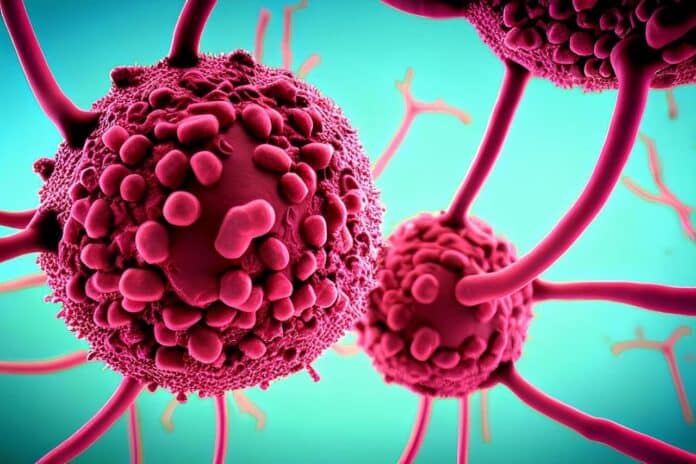Researchers at Cleveland Clinic in Florida have discovered how Kaposi’s sarcoma-associated herpesvirus (KSHV) triggers cancer in Port St. Lucie, Florida. This breakthrough could pave the way for novel therapies targeting cancers associated with KSHV, including Kaposi’s sarcoma and primary effusion lymphoma.
Dr. Jun Zhao of Cleveland Clinic Florida said, “Viruses contribute 10-20% of cancers globally. Although standard treatments can reduce tumor size, they fail to address the underlying viral infection. By comprehending how viruses transform healthy cells into cancerous ones, we can explore new strategies to combat these cancers effectively.”
Dr. Zhao led a study in Nature Communications showing how Kaposi’s sarcoma-associated herpesvirus (KSHV) alters human enzymes to change how cells make DNA, RNA, and process glucose. These changes increase the risk of tumor formation and cancer.
The virus activates a pathway that boosts cell growth and division. Using FDA-approved breast cancer drugs to block this pathway reduced virus replication, stopped lymphoma growth, and shrank tumors in tests on animals before clinical trials.
KSHV often goes unnoticed in the body, remaining dormant after the initial infection. However, it can reactivate when the immune system weakens, causing aggressive cancers in older people, those with HIV/AIDS, and transplant patients. KSHV-related cancers are rapidly growing and challenging to treat.
While many people in North America and Northern Europe carry KSHV (around 10%), its prevalence varies significantly worldwide, reaching over 50% in some areas. Many cases remain undiagnosed due to the lack of early symptoms. Studying KSHV can provide insights into other cancer-causing viruses.
Dr. Zhao teamed up with Dr. Michaela Gack to understand how the virus operates. Cancer cells grow fast by changing their metabolism. Viruses rely on human cells for energy and molecules. The virus hijacks CDK6 and CAD proteins in cells, making them produce more metabolites. This helps the virus replicate quickly, and cells grow out of control.
The researchers used Palbociclib, which blocks CDK6, and another compound to target CAD. In tests on animals before clinical trials, tumors shrank significantly: some disappeared entirely within a month of treatment, and others decreased by about 80%. Survival rates for specific lymphoma cells improved to 100%.
Dr. Zhao and his team aim to understand how KSHV, CDK6/CAD pathway, and cancer are connected. They plan to use this knowledge to develop and improve experimental drug combinations for clinical trials.
Dr. Zhao said, “Both viruses and cancers can change how cells work. We hope to find weaknesses in cancer-causing viruses and cancers by studying these changes. I’m excited to see where this research leads us.”
Cleveland Clinic researchers have conducted a study that helps us better understand how KSHV contributes to cancer development. This understanding will pave the way for new and improved treatment strategies for KSHV-associated cancers.
Journal reference:
- Wan, Q., Tavakoli, L., Wang, TY. et al. Hijacking of nucleotide biosynthesis and deamidation-mediated glycolysis by an oncogenic herpesvirus. Nature Communications. DOI: 10.1038/s41467-024-45852-5.
